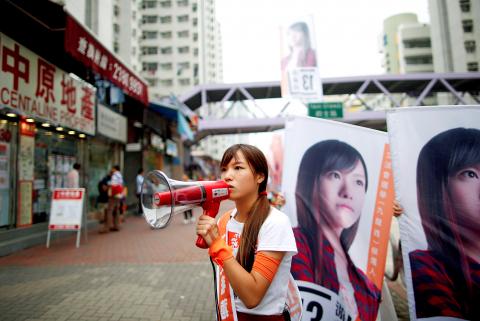Hong Kongers yesterday voted in their most crucial election since the handover from Britain in 1997, the outcome of which could pave the way for a fresh round of political confrontations over Beijing’s control of the territory.
The vote for Legislative Council lawmakers is to test the unity of Hong Kong’s pro-democracy camp, as a new generation of activists, who emerged in the wake of the 2014 pro-democracy Umbrella movement, joined the race.
They are hoping to ride a rising tide of anti-China sentiment as they challenge formidably resourced pro-Beijing rivals for seats.

Photo: Reuters
Many of the newcomers back the previously unthinkable idea of independence for Hong Kong, which has added to divisions with the broader pro-democracy movement and overshadowed the election.
Hong Kongers feel they have few other negotiating tactics left in their battle for genuine democracy as Beijing takes an increasingly hard-line stance.
“It’s bleak, but I think if China doesn’t leave us to do what we want, I think the only way is to fight for independence,” said Aron Yuen, a 34-year-old college lecturer, as he stood in a line of about 100 other people to cast their ballots.
“You can’t negotiate with somebody who doesn’t keep their promise,” Yuen said.
He planned to vote for the 23-year-old Nathan Law (羅冠聰) who, along with teen activist Joshua Wong (黃之鋒), played a key role leading the 2014 protests. Their party, Demosisto, advocates a referendum on “self-determination” of Hong Kong’s future.
At stake is the power to keep the territory’s widely unpopular Beijing-backed chief executive, Leung Chun-ying (梁振英), and his government in check. “Pan-democrat” lawmakers control 27 of 70 seats, compared with 43 held by lawmakers friendly to Beijing.
The democrats are fighting to keep control of at least a third of the seats, which gives them veto power to block government attempts to enact unpopular legislation, such as Beijing’s controversial election revamp that triggered the 2014 street protests.

People can preregister to receive their NT$10,000 (US$325) cash distributed from the central government on Nov. 5 after President William Lai (賴清德) yesterday signed the Special Budget for Strengthening Economic, Social and National Security Resilience, the Executive Yuan told a news conference last night. The special budget, passed by the Legislative Yuan on Friday last week with a cash handout budget of NT$236 billion, was officially submitted to the Executive Yuan and the Presidential Office yesterday afternoon. People can register through the official Web site at https://10000.gov.tw to have the funds deposited into their bank accounts, withdraw the funds at automated teller

PEACE AND STABILITY: Maintaining the cross-strait ‘status quo’ has long been the government’s position, the Ministry of Foreign Affairs said Taiwan is committed to maintaining the cross-strait “status quo” and seeks no escalation of tensions, the Ministry of Foreign Affairs (MOFA) said yesterday, rebutting a Time magazine opinion piece that described President William Lai (賴清德) as a “reckless leader.” The article, titled “The US Must Beware of Taiwan’s Reckless Leader,” was written by Lyle Goldstein, director of the Asia Program at the Washington-based Defense Priorities think tank. Goldstein wrote that Taiwan is “the world’s most dangerous flashpoint” amid ongoing conflicts in the Middle East and Russia’s invasion of Ukraine. He said that the situation in the Taiwan Strait has become less stable

CONCESSION: A Shin Kong official said that the firm was ‘willing to contribute’ to the nation, as the move would enable Nvidia Crop to build its headquarters in Taiwan Shin Kong Life Insurance Co (新光人壽) yesterday said it would relinquish land-use rights, or known as surface rights, for two plots in Taipei’s Beitou District (北投), paving the way for Nvidia Corp to expand its office footprint in Taiwan. The insurer said it made the decision “in the interest of the nation’s greater good” and would not seek compensation from taxpayers for potential future losses, calling the move a gesture to resolve a months-long impasse among the insurer, the Taipei City Government and the US chip giant. “The decision was made on the condition that the Taipei City Government reimburses the related

FRESH LOOK: A committee would gather expert and public input on the themes and visual motifs that would appear on the notes, the central bank governor said The central bank has launched a comprehensive redesign of New Taiwan dollar banknotes to enhance anti-counterfeiting measures, improve accessibility and align the bills with global sustainability standards, Governor Yang Chin-long (楊金龍) told a meeting of the legislature’s Finance Committee yesterday. The overhaul would affect all five denominations — NT$100, NT$200, NT$500, NT$1,000 and NT$2,000 notes — but not coins, Yang said. It would be the first major update to the banknotes in 24 years, as the current series, introduced in 2001, has remained in circulation amid rapid advances in printing technology and security standards. “Updating the notes is essential to safeguard the integrity